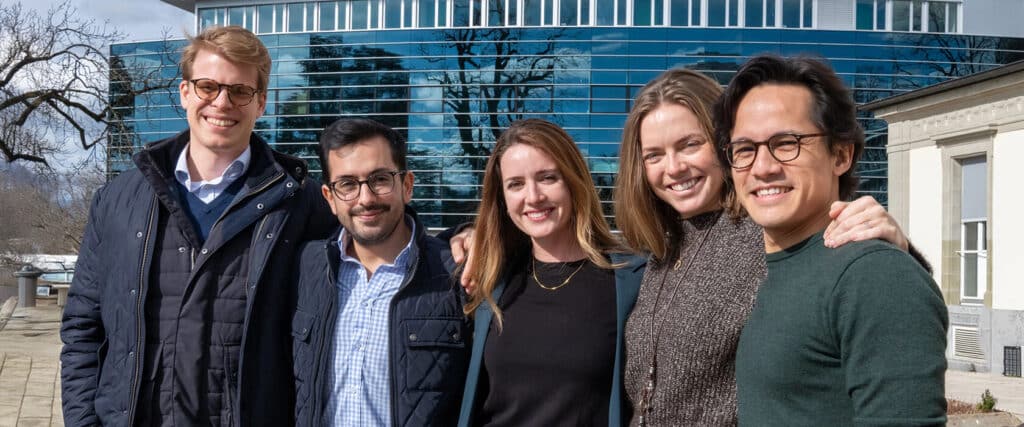Yale’s Vision for Executive Education
In this interconnected world, business decisions can ripple across communities. Therefore, it is crucial to empower executives to view business challenges from multiple perspectives.
The MBA for Executives (EMBA) at Yale School of Management (SOM) emphasizes the importance of considering multiple stakeholder perspectives. “The Executive” course within the program serves as a capstone experience, synthesizing the program’s emphasis on broad, integrative thinking.
Let’s explore what this executive perspective entails and how Yale’s curriculum equipped students of the 2024 cohort for the complexities of business leadership.
Yale’s Integrated Core Curriculum
Yale EMBA’s 22-month integrated core curriculum includes courses that present diverse perspectives, encouraging students to analyze business problems through various lenses. Students approach business problems from the perspectives of the customer, competitor, workforce, innovator, investor, the state, and society.
In the EMBA’s second year, students delve deeper, engaging with advanced management courses, specialized tracks, and a selection of electives. There is also the opportunity for independent study under the guidance of a Yale professor, providing students the freedom to explore a topic of personal interest in depth.
The program culminates with a class called The Executive, which focuses on the executive perspective – a comprehensive view that considers the multifaceted aspects of business.
Feli Oikonompouiou elaborates on how the program builds up to The Executive. “We have classes considering business through different perspectives. Through the customer perspective, the investor perspective, et cetera. This class, [which] comes at the end of the year, aims to [bring] together everything.” (00:09)
This core curriculum gradually broadens students’ understanding of organizational dynamics, culminating in the capability to navigate complex, high-level decisions as an executive. This holistic approach equips students with critical analytical skills and instills an appreciation for the interconnectedness of global business ecosystems.
Learning from Real-World Challenges
The Executive’s teaching methodology employs case studies for practical insights.
Anna Levine shares, “At the start of every week, we read a case and answer preliminary questions about it with our group. And then there’s a class session where you hear directly from the founder or CEO who faced the case.” (00:49)
Case studies are a regular part of almost every MBA program. However, the opportunity to converse with the executives who faced the issue themselves is unique to a prestigious business school like Yale SOM.
As Aaron Turczynski puts it, “It’s great to read a case. It’s great to have a discussion with brilliant peers. But to actually talk to the people who went through those problems, what they learned, what they wish they would’ve done differently, to me is the most value-add thing that we can get out of these experiences.” (01:07)
The Yale Executive MBA’s facilitation of dialogue with business leaders greatly enriches the learning experience, setting it apart from other programs. This direct engagement offers students unparalleled insights, grounding their education in the realities of business leadership and decision-making.
Nike’s Space Hippie Shoes: A Case Study
One case study looked at in the class is the development of the Nike Space Hippie sustainable shoe. Jon Iwata, Lecturer in the Practice of Management, notes this case showcases the significance of adopting a multi-stakeholder approach. (01:34)
The Nike team approached the project with a broader objective in mind: to deliver a product that would appeal to consumers for its quality and design, be feasible for mass production to meet supply chain demands, and be financially beneficial for investors. This comprehensive strategy ensured that the Space Hippie shoe was not only sustainable but also desirable, scalable, and profitable.
Cultivating Future Leaders
Yale SOM’s focus on the executive perspective prepares students for leadership roles. It stresses the importance of a shift from the traditional profit-centered mentality to a more holistic approach to decision-making.
Aaron explains the need for this evolved focus. “There’s much more of an emphasis on making sure you no longer only care about the bottom line. You need to start to understand how your decisions are going to impact multiple people. The only way you can really do that is by taking on these different lenses of looking at your employees, looking at your shareholders, looking at society as a whole, and looking at your bottom line.” (00:26)
Ravi Dhar, the George Rogers Clark Professor of Management, clarifies that prioritizing a broader spectrum of considerations does not negate the importance of profitability.
“The important lesson that we are trying to communicate in this course is this not an ‘or,’” Professor Dhar explains. “It’s not that you create value for the shareholders ‘or’ you redistribute that money to the employees, the community, or a third party. We think the most powerful solutions are going to be going to be an ‘and.’ Which is, you’re creating value for the different stakeholders ‘and’ simultaneously, you’re creating value for the company.” (03:38)
Yale SOM’s MBA for Executives is committed to molding future leaders capable of navigating the complexities of modern business. Through its pioneering integrated curriculum and emphasis on a holistic executive perspective, the program equips students with the vision to drive meaningful change. Embracing this executive perspective is vital in our interconnected world.
Interested in exploring Yale SOM’s unique educational approach further? Visit our Yale School of Management profile page.





